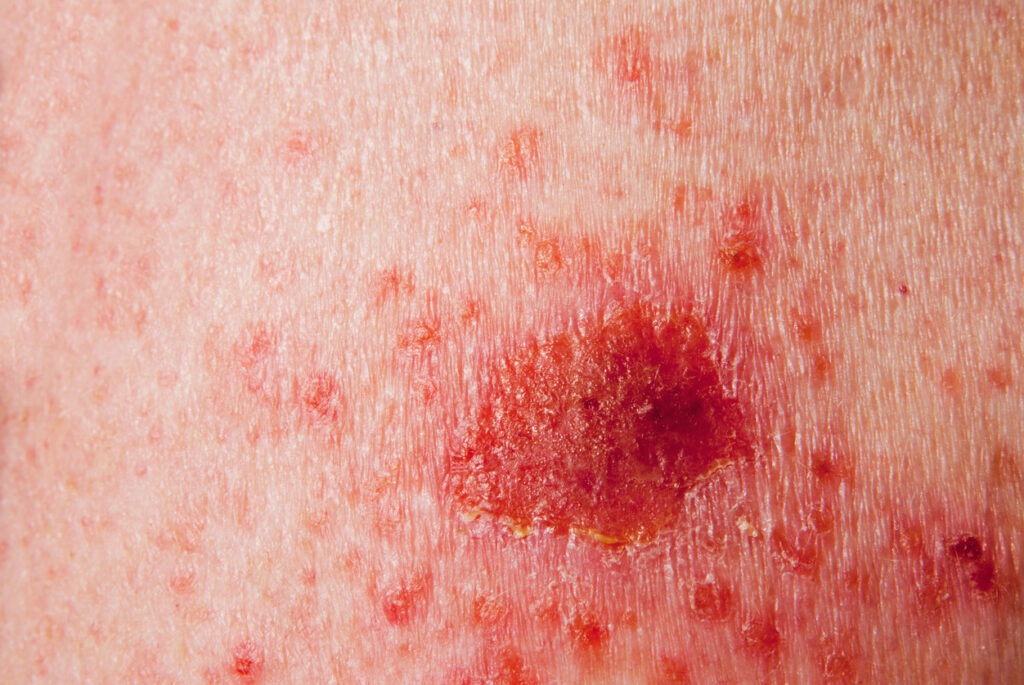Verrica Pharmaceuticals Inc.’s VP-315 is showing promise in the treatment of basal cell carcinoma, according to Part 2 of its Phase 2 clinical trial.
VP-315 is a potential first-in-class oncolytic peptide immunotherapy designed to be administered directly into a tumor to induce immunogenic cell death.
All patients treated with VP-315 had a reduction in tumor size with an overall reduction in tumor size of all lesions treated in Part 2 of approximately 86%, an approximately 51% of lesions treated in Part 2 achieved complete histological clearance, the study found.
Patients with residual tumor on average achieved an approximate 71% reduction in tumor size.
“The preliminary results from Part 2 of the trial show greater than 50% complete histological clearance and a significant reduction in tumor size for tumors treated in the study, which we believe has the potential to vastly improve patient outcomes versus current therapies and surgical procedures,” says said Gary Goldenberg, MD, Verrica’s Chief Medical Officer, in a news release “In addition, given the immunomodulatory properties of VP-315, we are also excited to continue to explore these properties in tissue and blood samples.”
“VP315 has the potential to change the way dermatologists treat basal cell skin cancer. Patients may be cured with simple injections of VP-315,” adds Jonathan Kantor, MD, a dermatologist and Mohs surgeon at Florida Center for Dermatology, which was the leading enrollment site for the clinical study. “Those patients that have residual tumor, can have surgery and decrease their surgical scar by more than 70%. It’s very, very exciting data.”
The Phase 2 trial is a 2-part, open-label, multicenter, dose-escalation, proof-of-concept study with a safety run-in designed to assess the safety and tolerability, pharmacokinetics, and efficacy of VP-315 when administered intratumorally to adults with biopsy-proven basal cell carcinoma.
The study enrolled 92 adult subjects with a histological diagnosis of basal cell carcinoma in at least one eligible target lesion.
Part 2 preliminary results are based on 93 confirmed basal cell carcinoma lesions that were treated during Part 2 of the Phase 2 trial; however, for histologic reduction in tumor size and overall reduction in tumor size, data from three of the 93 lesions are pending. The key preliminary Part 2 results were:
- No dose-limiting toxicities or Treatment-Related Serious Adverse Events were reported. Most Treatment Related Adverse Events were expected mild to moderate cutaneous reactions (n=93).
- 51% of lesions treated resulted in complete histologic clearance, with no residual tumor cells (n=93).
- Histological reduction of tumor size in those subjects with remaining tumor was 71% (n=90).
- All patients treated with VP-315 had a reduction in tumor size with an overall reduction of tumor size in all subjects (those with no residual tumor and those with residual tumor) of 86% (n=90).
The Company expects genomic and T-cell (immune response) data in the first quarter of 2025 and plans to request an End-of-Phase 2 meeting with the FDA to determine next steps for the development of VP-315 for the treatment of BCC in the first half of 2025. The Company also plans to submit the final Phase 2 data for presentation at future medical meetings.
Verrica has an exclusive worldwide license to develop and commercialize VP-315 for dermatologic oncology indications, including non-metastatic melanoma and non-metastatic merkel cell carcinoma, and intends to focus initially on basal cell and squamous cell carcinomas as the lead indications for development. VP-315 has demonstrated positive tumor-specific immune cell responses in multi-indication Phase 1/2 oncology trials. The timing of any future clinical trials of VP-315, if any, will be determined after the conclusion of the current Phase 2 trial for basal cell carcinoma.
For additional information about this clinical trial, please visit clinicaltrials.gov, identifier NCT05188729.


